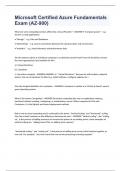Exam (elaborations)
Microsoft Certified Azure Fundamentals Exam (AZ-900)
- Course
- Institution
Microsoft Certified Azure Fundamentals Exam (AZ-900) What are some computing services offered by a Cloud Provider? - ANSWER-•*Compute power* - e.g. Servers or web applications •*Storage* - e.g. Files and Databases •*Networking* - e.g. secure connections between the cloud provider and on-...
[Show more]



